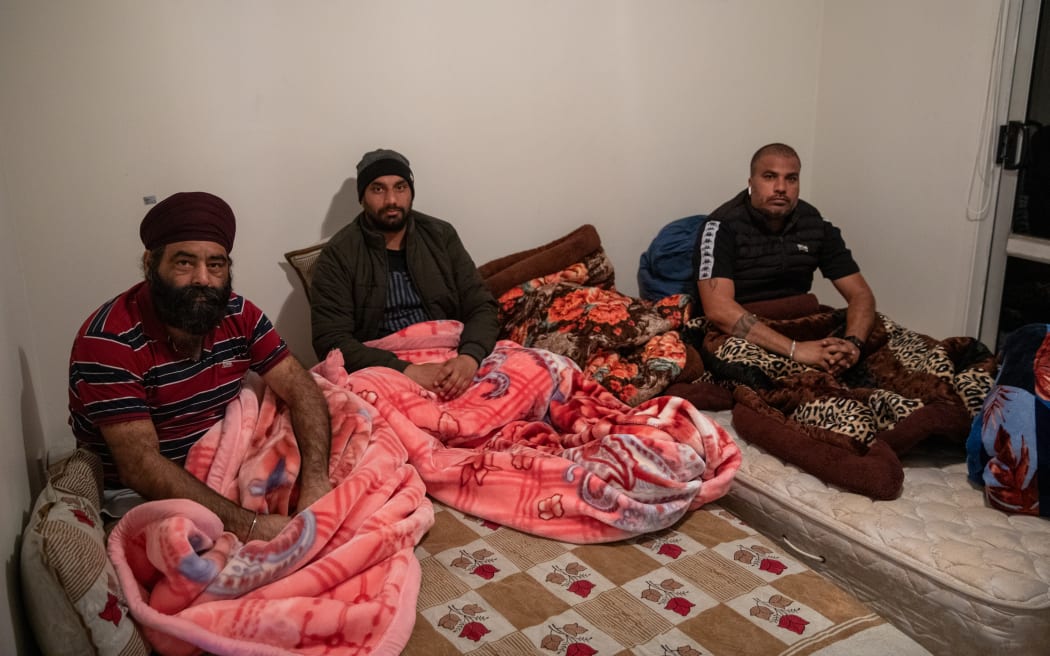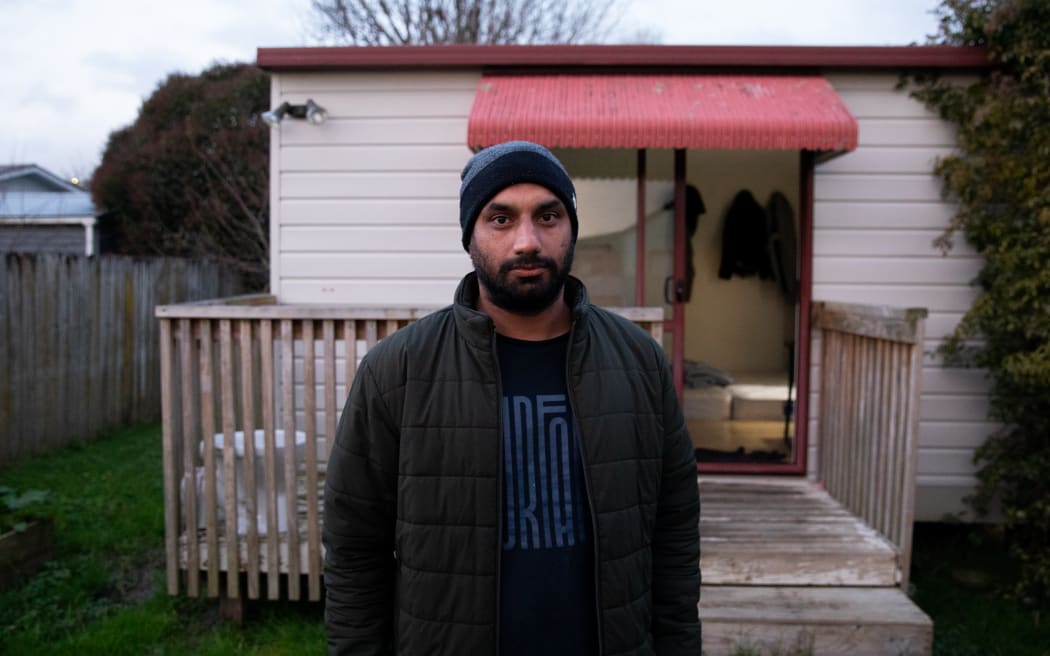
Workers are crammed into small rooms in an Auckland house. Photo: RNZ / Blessen Tom
A spike in shocking cases of exploitation has put the plight of migrant workers in the media spotlight. But these latest stories are part of a longstanding issue that's sometimes flown under the radar despite the efforts of a few journalists.
On Monday, Nick Truebridge sat in the Newshub at 6 studio after it aired his story about 40 migrant workers holed up in a Papakura house without food.
"I've got to say as a Kiwi it was pretty embarrassing standing there last night," he told presenters Samantha Hayes and Mike McRoberts. "I don't think any of us should accept this as normal."
Truebridge followed that with another story the following night about four more substandard properties crowded with migrant workers.
He took the Newshub camera on a tour of one of the houses, revealing crammed bedrooms and broken pipes leaking sewage under the house.
That seemed less than ideal, and Truebridge explained the migrants had been subjected to these conditions after trying to find a better life under the Accredited Employer Work Visa Scheme.
He’s not the only one who’s been covering the plight of workers suckered in by offshore immigration agents illegally selling non-existent jobs under that scheme, which Immigration NZ acknowledges is a “higher trust model” than the six visa options it replaced a year ago.
At RNZ, Lucy Xia has been telling the stories of migrants allegedly exploited and left all-but destitute after being told they’re heading into decent jobs.

Gurvinder Singh has been working as a truck driver in Dubai for the past eight years. Photo: RNZ / Blessen Tom
One of those victims, Keisha Kung, told Xia she survived on instant noodles and foraged food after travelling to Dunedin for work that never materialised.
On Wednesday the New Zealand Herald’s Lincoln Tan reported that 164 accredited employers are under investigation for migrant exploitation.
At his newsletter The Kaka, Bernard Hickey has called the proliferation of immigration scams a symptom of our “churn and burn” economy.
"There was a time New Zealand, or at least its former PM John Key, aspired to become the ‘Switzerland of the South Pacific’ - providing high-value financial services to the world’s richest families.
"Instead, we’ve become a version of the Dubai of the South Pacific - allowing fraudulent agents and fly-by-night firms to bring in desperate and poor workers with suggestions of high-paid jobs and residency, only to pull the rug out from under their feet and leaving them indebted and even more desperate," he wrote.
At Stuff, national correspondent Steve Kilgallon has been following the story for months, first reporting in April on migrants who were left out of a job and penniless after paying thousands of dollars to agents promising lucrative work.
Immigration Minister Andrew Little ordered an urgent review of the Accredited Employer Visa Scheme on Thursday, after initially denying any link with the apparent rise in migrant exploitation.
The media reporting has also led directly to improvements in the workers’ lives in several cases.
In June, Kilgallon reported on Bao Guo who was surviving on instant noodles after going deeply into debt to get a job that laid him off within days.
Guo was offered a full-time job at the Papakura door manufacturer Superior Doors after its owner, Aaron Davidson, was moved by his plight.
For Truebridge it’s early days, but those Papakura workers from his first story who were going without food have been fed. Now he says they’re on the lookout for work.
This seems to be a classic case of journalism doing what it's meant to: comforting the afflicted and afflicting the comfortable.
But it’s also notable that it took 40 people running out of food in a sodden, crammed house for the story to make the 6pm news.
The dire reality of these migrants' plight may hint at a sense of impunity for their immigration agents or their sometimes elusive employers.
The workers often don’t have a support network in New Zealand. They’re in a precarious economic situation and many of them don’t speak English.
As a result, they don’t always get the attention of the authorities – or the media.
Kilgallon told Mediawatch it was hard to imagine this situation escalating to the same extent - at least without huge media coverage - if the victims were from a different background, or possessed a higher socioeconomic status.
When he started covering the stories of low-wage migrants workers about six years ago, he found there was little competition for the stories outside of Lincoln Tan.
"Our society sort of functions on low-wage migrants running our petrol stations and our liquor stores and we don't really look at the circumstances in which they're working for us. I think there's an element of collective blindness that we don't really want to know about it because it would expose their living conditions and we're almost complicit in it," he said.
Kilgallon said media organisations had not always been good at telling these migrants' stories, partly because newsrooms had historically been relatively white and middle-class.
They also might envision their audience, whether consciously or not, as being similarly affluent.
"I mean, why do we have big real estate sections in every newspaper in the country?" he said. "But it's our job to speak to everybody in New Zealand."
He's had most success with stories that put faces to the visa scams, and show the conditions exploited migrants have to endure.
"The issues are important but you have to present a human face to the issues," he said.
"When I have done that well, I get a lot of emails saying: 'As a New Zealander this disgusts me. Can I help these guys?'."
Being able to make that kind of impact is one of the main things that keeps him covering this topic.
He's not always hopeful for systemic change, particularly given the "shrewdness" of some of the organisations running these schemes - but he's able to make a difference on an individual level.
"I'm always interested in stories where you hope there might be a positive outcome. It struck me over time that some of these stories were having a good outcome for the people I was writing about, and if I kept writing them maybe we'd see some systemic change.
"But at least we'd seen changes in the lives of people that had been brought here and sold the dream and left in these horrific living conditions."


